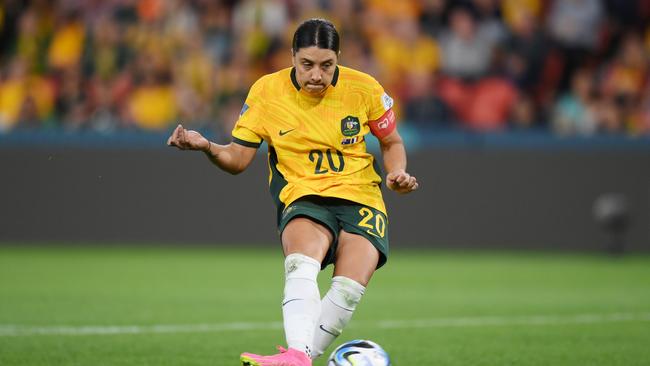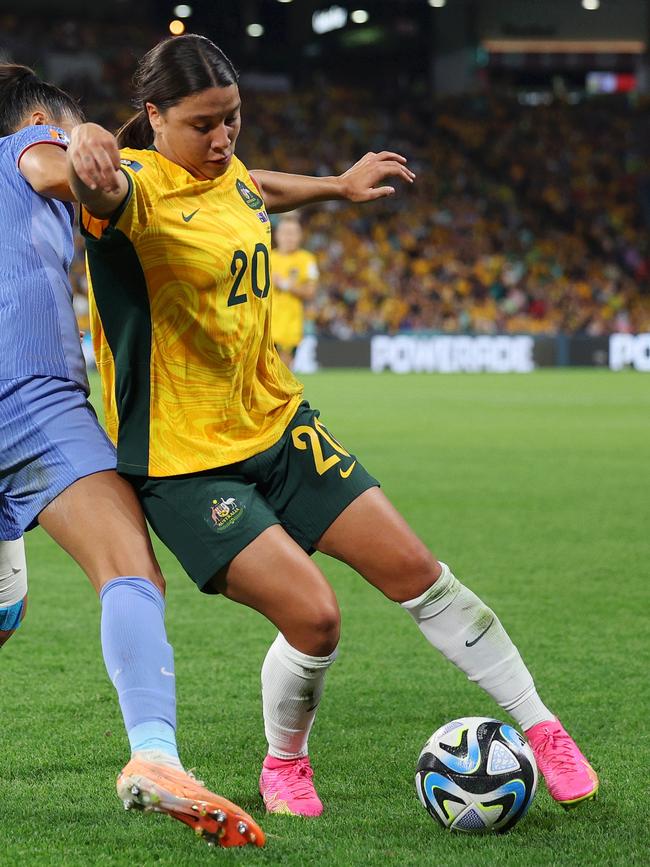Sam Kerr details why she had to hide her gender as a junior footballer
Sam Kerr has opened up on her challenges growing up as a junior in South Fremantle and why she felt she had to hide her gender.
Football
Don't miss out on the headlines from Football. Followed categories will be added to My News.
Sam Kerr is known the world over as one of the greatest strikers the game has ever seen, and this World Cup has shown the embrace of a nation that truly cares about the Matildas.
It comes after a generation of fighting from pioneers of women’s football for things like equal pay and conditions – fundamentally, the right to be seen equally.
When Kerr was growing up in East Fremantle, south of Perth, however, this wasn’t the case.
Growing up playing junior Australian rules football for South Fremantle, Kerr said she kept her gender a secret as a “five or six” year old after being allowed to play in one of the boys’ teams.
“I knew I’d be the only girl on the team but that didn’t worry me at all,” Kerr wrote in her new book My Journey to the World Cup.

Kerr said her teammates assumed she was male because of her “short hair and blonde tips”, but was comfortable with it, and decided to “keep (her) gender a secret because I didn’t want them to treat me any differently just because I was a girl.
“I remember one of the boys crying when he found out.
“But as good as I was out on the field, and as much as I loved playing the game, the physical differences between the guys and me eventually became too pronounced and the play was too rough.
“One day, I came home from a game with yet another black eye and bloody lip, and that’s when my dad and brother both said, ‘Nup, this isn’t happening anymore’.
“I was getting battered around so much out on the field that it was getting to be a big problem. Dad and my coach both sat me down then and said it was getting far too dangerous for me to continue to play.
“They said they were sorry, but that I wasn’t allowed to play football any more. I understood the reasons why, but I was heartbroken. Back then, there were no girls’ teams in my area for me to join, and to know that I’d never play a sport that I loved so much ever again was devastating.”
Without there being any junior girls’ Australian rules teams in her area, Kerr would move away from the sport she loved, and into the round-ball code at the age of 12, making her professional debut and earning her maiden Matildas cap by the age of 15.
The rest is history.


Kerr’s experience is not unique, with a number of the Matildas speaking out about similar experiences growing up.
Ellie Carpenter spoke of the growth of the women’s game from when she was a junior, growing up in Cowra in central New South Wales.
“When I was growing up, I was with a boys’ team, I didn’t have a girls’ team,” Carpenter told press after the 2-0 win over Denmark in the Round of 16.
“I went and watched the Matildas play when I was 12 years old, and I think there was 300 people in the stadium, but that still wanted me to play for Australia.
“I still was dreaming to play on that pitch with the girls, and I think now if I was a 12 year old, in Stadium Australia watching sold out crowds, like how amazing that is for them, young girls, young boys to see that.
“How far we’ve come is just unimaginable.”
It comes as figureheads in Australian football call on governments, both state and federal, to fund the sport appropriately, pointing to the mania around the game.
Former Socceroo Craig Foster called out the politicians hopping on the Matildas’ bandwagon.
“Every MP who‘s held up a ’go Matildas’ sign or put out a tweet saying ’Tillies till I die’, there’s receipts and I’ve tucked them all away, and I’ll be coming for you in the future, because there’s a price to pay when you’re doing that,” Foster told The Canberra Times.
Sports diversity and inclusion advocate Rana Hussain summed it up with a reference to Bob Hawke.
“Any sports club that doesn’t have girls’ toilets and change rooms after this is a bum,” Hussain wrote on Twitter.
Originally published as Sam Kerr details why she had to hide her gender as a junior footballer





